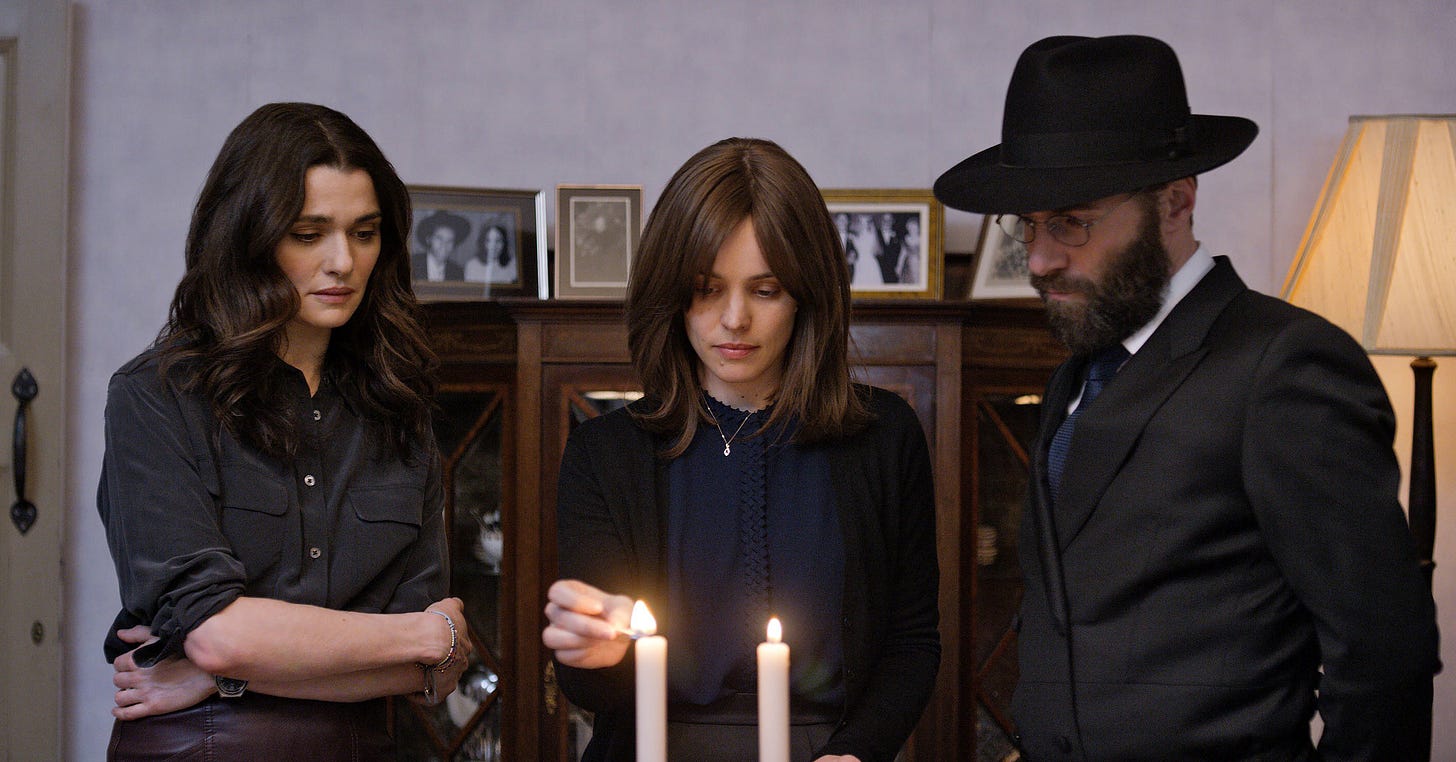Welcome to Pride Week here at From The Yard To The Arthouse, certainly the most ethically-tricky week for someone like me, a cis male. I write this in advance – please let me know if I improperly use certain terms or expressions, I have been away from society for a while, and I am always trying to be respectful and learn more. I hope my LGBTQ brothers and sisters are properly enjoying Pride Month, despite living in a world increasingly hostile to their very existence.
Sebastian Leilo’s “Disobedience” is a thorny movie to discuss, because it stars two seemingly straight conventionally-attractive white females as lesbian lovers. There was a mini-trend for a few years of these proper, stiff-upper-lip lesbian dramas about secret sapphic love affairs, but “Disobedience” wasn’t, isn’t, one of those. This is a movie that seems pretty unabashedly steamy and forbidden, in almost a cheeky way. This is a sexy romance with a safe word.
Ronit, now going by the more secular Ronnie, has returned to London after a brief sojourn to America. She’s Rachel Weisz, so she’s beautiful and elegant, as per usual. We expect a woman like this to be greeted warmly upon arriving to her Orthodox Jewish community, here to dissolve the estate of her now-dead father. But she is turned away, harumphed in public places by elders. Ronit didn’t go to New York simply to be a photojournalist – it’s clear she was exiled, ostracized due to a past transgression. She is unsurprised by this coldness, though shepherding the memory of her father is seemingly her only innocent intention.
Ronit’s return is greeted by her childhood friends, Esti and Dovid, whom she is surprised to learn have married. Dovid, who looked up to Ronit’s father, is now a Rabbi prepared to take the deceased’s place within the synagogue. He does not suspect that Esti (Rachel McAdams) has long harbored a forbidden love for Ronit. While Ronit pursued her independent interests, it’s Esti who adhered to the tenets of her religion, standing nobly by Dovid’s side even as she feels no affection for him.
Esti offers Ronit moral support, though it’s clear there’s nothing “moral” about it – these two are into each other. Ronit escaped to be an independent woman of sorts, but her expectation was that Esti would try the same. Instead, she retreated, and is now dedicated to Dovid, an interesting union considering Dovid, a devoted practitioner, is played by the excessively-handsome Alessandro Nivola. I never found Nivola all that interesting or likable, but he’s got a strong nose for material and/or an excellent agent. He went from Maybe Leading Man in crappy movies to Character Actor That Occasionally Does A Christopher Walken Impersonation within the margins of good movies. I know no one saw “Amsterdam”, but he’s pretty amusing in that as a beyond-dumb Keystone Kop.
Nivola seethes and frets as he begins to see his wife’s notable extracurriculars, but his authority in the house is entirely usurped by this dalliance, which begins to get steamy enough to allow for late night hotel stays. Leilo is a director who lets actors move within the space of his frame, so Weisz and McAdams are allowed to push-pull through this narrative as two beautiful women who know their passion could destroy a small community. It’s a little soapy, but Weisz is so intoxicating as the Woman Of Bad Influence that you end up rooting against Dovid, even as Dovid begins to fall apart.
This is a movie about processes, ones that may have grown distant. Ronit has little patience for the manner of her father’s passing, hoping to get it over with. And even as Dovid sees his marriage torn apart by this infidelity, he remains dedicated towards taking a powerful stance within the synagogue and reminding his followers of their spirituality. Leilo decisively depicts this as a battle between modernity and the ways of the past, and he leans towards the former. It’s a respectful enough movie to suggest those mindsets might be collaborative. I wonder what Leilo really thinks.
One of the quirks of communication from prison is that your list of people with whom you communicate must be approved. You make a list of the people you wish to call on the phone, their numbers and addresses, and they are approved. Generally, they’ll try to ensure the person with whom you wish to contact isn’t involved in your case somehow, but beyond that, you can talk to anyone. When you call, the person on the other line receives an automated message letting, maybe warning, that they’ll be receiving a call from prison. They are given the option to accept, but very quickly they’re also given the choice to block your call. The automated system we used really went out of its way to tell people they were getting a call from a criminal, and that it may not be wise to accept the call.
I never had a contact blocked. Which is why it was peculiar to read this article about the restrictions on who people could call or couldn’t call. It surprised me to learn that the prison was not acting to block these contacts, but instead the independent companies working with the prisons were acting on their own. Why is a private company involved with who you do or do not contact? Companies like Securus have no role in law enforcement and incarceration. They’re meant to facilitate calls and emails, and accept a payment as a result. Apparently, restrictions on inmates are coming from private companies. How else are private companies involved in mass incarceration?








I'm long overdue for catching up on this one; I'll probably remedy that later this week.
Infinite love for Lelio. He won an Oscar for his film A Fantastic Woman, and it caused trans rights to become a source of national pride in his native Chile, which translated to legislative progress for said rights in the country. It at once illuminated the practical importance of queer cinema, and how grossly artificial the political problematization of trans people really is (not that that isn't already glaringly obvious to anyone who lives in the world, but even so).
Your posts always make me want to see films I had no interest in seeing. You make them sound so interesting!